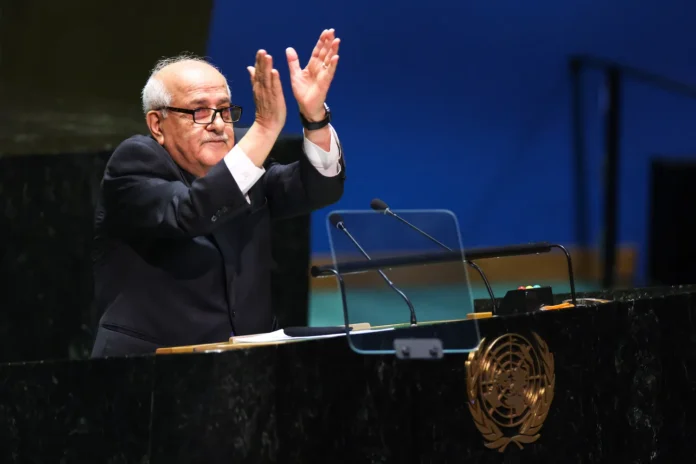The United Nations General Assembly voted 143 to 9, with 25 abstentions, on Friday in favor of granting new “rights and privileges” to Palestine. It also called on the U.N. Security Council to “favorably” reconsider making Palestine the 194th member of the international body.
Granting Palestine full U.N. membership would send a “message in support of the two-state solution,” Emirati Ambassador to the U.N. Mohamed Abushahab said after introducing the resolution. In response, Israel symbolically shredded a copy of the U.N. Charter.
The General Assembly recognized Palestine as a nonmember observer in 2012. Only nine nations, including Israel and the United States, voted against the measure at the time. Since then, the Palestinian Authority, which exercises limited self-rule over the West Bank, has overseen the U.N. mission, and Palestine has joined several U.N. bodies, including the International Criminal Court in 2015.
Friday’s resolution gives Palestine the right to speak on all issues, not just those related to the Middle East; the ability to propose agenda items and participate in debate; the right to sit on U.N. committees; and the opportunity to attend U.N. conferences. It does not, however, grant Palestine the right to vote in the General Assembly. The final text excluded wording that would have put Palestine “on equal footing with member states” and said Palestine’s acceptance was “on an exceptional basis and without setting a precedent,” appeasing Chinese and Russian concerns that admitting Palestine would pave the way for Taiwan and Kosovo to also join the U.N., which China and Russia do not recognize as sovereign nations.
The U.N. Security Council must recommend a state’s formal admission to the General Assembly for final approval. But Robert Wood, a U.S. deputy ambassador to the U.N., indicated on Thursday that the White House opposes the resolution and will veto any such measures. “We have said from the beginning the best way to ensure Palestinian full membership in the U.N. is to do that through negotiations with Israel,” Wood said. In April, Washington vetoed a popular resolution that would have paved the way for full Palestinian membership; it was the only Security Council member to vote against the resolution.
U.S. legislation also dictates that Washington is required to halt all funding for any U.N. agency that gives full membership to Palestine, which the United States was forced to do with UNESCO in 2011. Friday’s resolution contained diluted language so as not to trigger a cutoff of U.S. support.
Israel stated that the resolution’s passage “will not change anything on the ground” in Gaza. On Friday, Israeli forces captured the main road dividing eastern and western Rafah, effectively encircling the eastern part of the city. The U.N. agency for Palestinian refugees estimates that nearly 110,000 people have fled Rafah since Monday, many of them escaping to Khan Younis, only to face another city that has been devastated by war and is still coming under Israeli bombardment. On Thursday and overnight Friday, the Israeli military carried out deadly airstrikes in Khan Younis as well as in the northern areas of Gaza City and the Jabalya camp.
The United Nations warned on Friday that aid into the Gaza Strip could halt in mere days. As part of the Rafah offensive, Israel closed two border crossings into southern Gaza. It has since said it reopened Kerem Shalom checkpoint, but aid agencies have said they still cannot get supplies through.
Palestinian Ambassador to the United Nations Riyad Mansour speaks during a special session of the U.N. General Assembly regarding the Palestinian bid for full membership in New York City on May 10.Charly Triballeau/AFP via Getty Images
Foreign Policy




